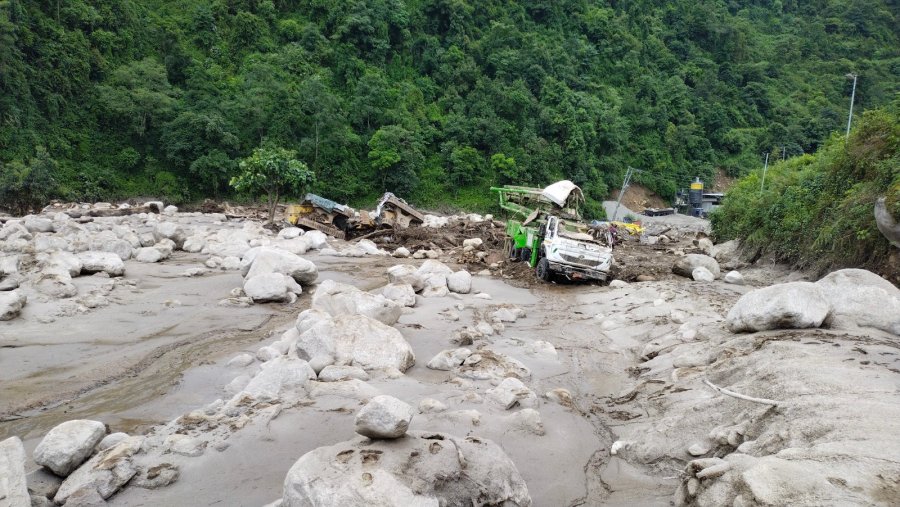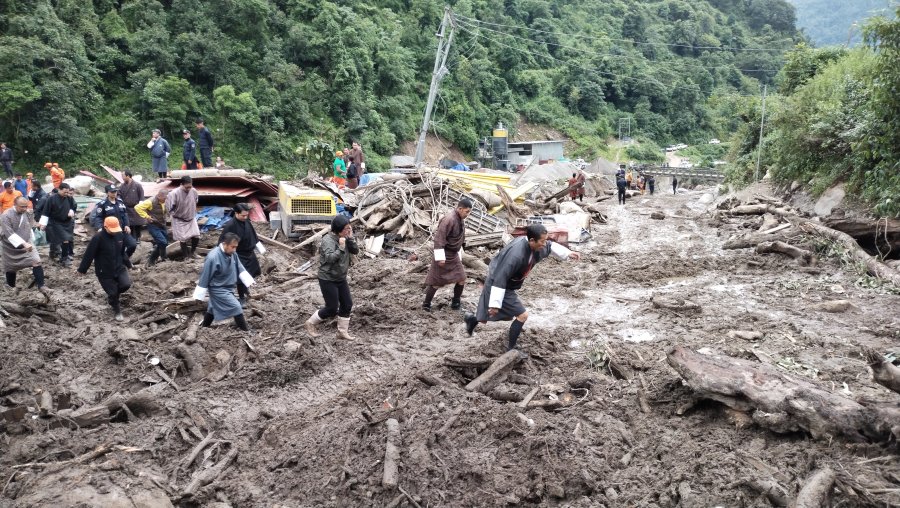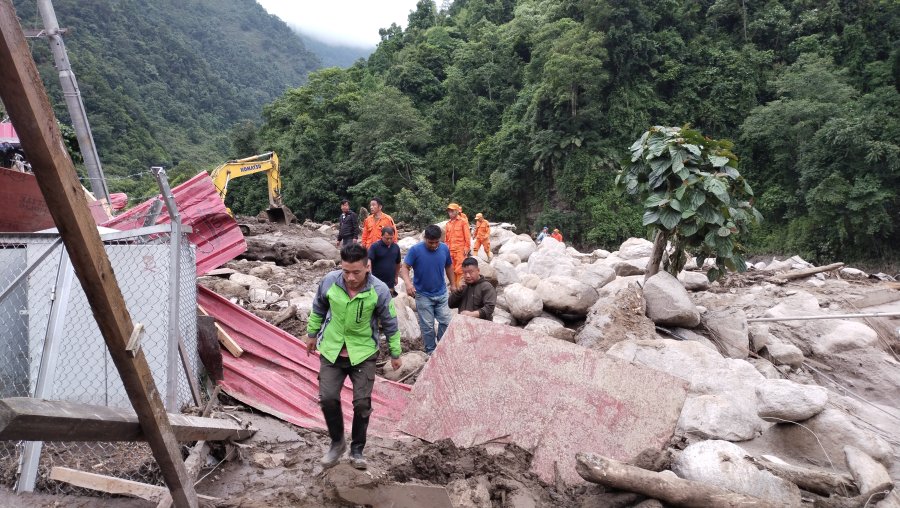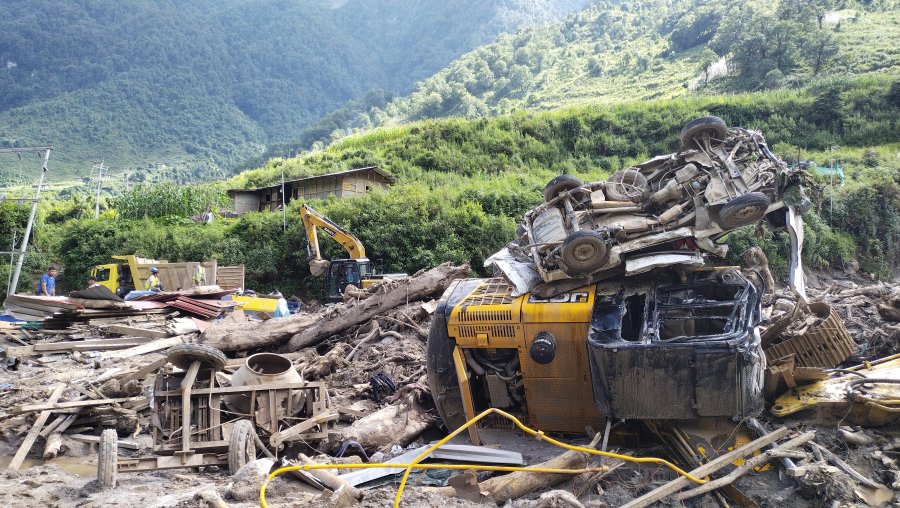July 27, 2023
THIMPU – The picturesque Himalayan Kingdom of Bhutan, with its breathtaking landscapes and commitment to environmental preservation, faces a paradoxical reality.
While being a net sequester of greenhouse gases (GHG), Bhutan is also highly susceptible to the destructive forces of nature, fueled by climate change.
As global warming intensifies, the effects of climate change are becoming increasingly evident, manifesting in hydro-meteorological and geological hazards such as flash floods, landslides, glacial lake outburst floods (GLOFs), and windstorms.

Images from flood-hit Ungar village. Photo: Kuensel
The recent flash flood incident in rural Bhutan serves as a stark reminder of the urgent need for resilience and preparedness.
On July 20, 2023, an incessant downpour triggered a flash flood in the remote Ungar village under Lhuentse district, claiming the lives of 23 individuals and leaving behind a trail of devastation.

Images from flood-hit Ungar village. Photo: Kuensel
As of July 26, 15 people remain missing, and rescue teams continue their arduous efforts to recover the bodies.
This catastrophe has shattered the tranquility of Ungar village, which was considered a safe haven by its inhabitants, who had not experienced such a disaster for centuries.
The flash flood swept away vital infrastructure, including Druk Green Power Corporation’s (DGPC) guest house, four residential blocks, hostels, official quarters, and communal facilities.
Furthermore, precious machinery, worth millions, along with eight private light vehicles, were lost to the unforgiving floodwaters.
The damage extended to agricultural fields and resulted in the loss of 10 cattle.

Images from flood-hit Ungar village. Photo: Kuensel
Preliminary investigations conducted by officials from DGPC, Lhuentse district disaster management division, and local government leaders revealed that a sudden heavy rainfall as the primary trigger for landslides along the course of the seasonal stream, Nyewanchhu.
“This obstruction could have disrupted the stream’s flow, leading to the flash flood,” DGPC Managing Director Dasho Chewang Rinzin said.
Some said that the flash flood could have been triggered when many small tributaries upstream swelled and formed an artificial lake, which later burst due to heavy rain.
Nyewanchhu, the stream adjacent to the camps where Druk Hydro Energy Limited workers and their families resided, is known for providing inadequate water supply.
“It is a small tributary of Yungichhu that hardly provides enough water for workers to drink,” Dasho Chewang Rinzin said, adding that the camps were set up at the present location last year after assessing the safety of the site.

Images from flood-hit Ungar village. Photo: Kuensel
It is concerning that a flood hazard assessment conducted by the Flood Engineering and Management Division in 2019 did not identify Ungar and Meadtsho county as prone areas, emphasising the need for more comprehensive disaster preparedness measures.
The flash flood in Ungar village adds to Bhutan’s list of significant water-induced disasters over the past three decades.
According to a record maintained by the National Center for Hydrology and Meteorology, Royal Government of Bhutan, Cyclone Aila in 2009 claimed 12 lives and caused US$17 million worth of damage.

Images from flood-hit Ungar village. Photo: Kuensel
In 2000, devastating floods hit Pasakha, a thriving industrial colony, claiming 33 lives and damaging numerous concrete buildings.
In 1994, the GLO incident from Luggye Tsho (glacial lake) resulted in 21 fatalities and significant damage to 91 houses and 1,781 acres of land in the Punakha-Wangdue valley.
Despite its commitment to environmental conservation and carbon neutrality, Bhutan remains susceptible to the impact of climate change.
Over 70 percent of the nation’s land area, covering 38,394 square kilometers, is under forest cover, underscoring the need to safeguard this valuable natural resource.
The Inter-Governmental Panel on Climate Change (IPCC) has long warned about the intensification of the hydrological cycle due to climate change.

Images from flood-hit Ungar village. Photo: Kuensel
The Fifth Assessment Report (AR5) of the IPCC projects a staggering increase of approximately 4.8°C in global mean surface temperature by the end of the century, demanding immediate attention and action.
As Bhutan grapples with the consequences of climate change, fostering resilience and preparedness is imperative.
Jigme Wangchuk, the feature editor of the daily national newspaper, Kuensel, highlights the rising frequency and intensity of extreme weather events.
Embracing resilience as a way of life and investing in cutting-edge early warning systems, disaster response training, and community drills are crucial steps in mitigating the loss of lives.
Bhutan must also reimagine its development approach through the lens of climate science.
Integrating climate-resilient designs into critical infrastructure, including hydropower facilities, agricultural lands, roads, bridges, and buildings, according to Jigme Wangchuk, is no longer a choice but an essential necessity.
The recent flash flood in rural Bhutan underscores the urgent need for proactive measures to combat the adverse effects of climate change.
As a nation known for its environmental stewardship, the CEO of Kuensel Corporation Limited, Ugyen Penjor, said that Bhutan must lead by example and collaborate with the global community to protect its people, preserve its natural heritage, and build a sustainable future for generations to come.
“The time to act is now – embracing resilience, preparedness, and climate-conscious development is key to securing a safer and more prosperous future for the Himalayan Kingdom,” Ugyen Penjor summed up.


